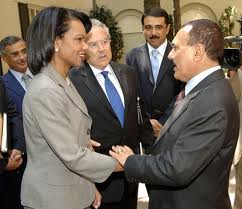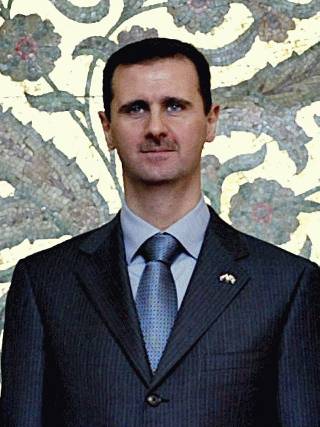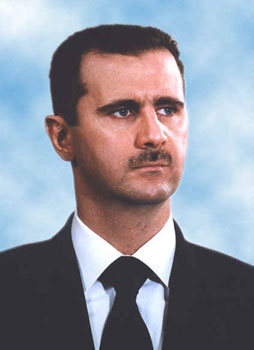 Protesters in south Yemen called for the secession of the once independent south today. Security forces were out early in the day with tanks and police to force protesters back inside. Scores of protesters were moved off of the streets of Aden, but dozens managed to get out in Crater, Khor Maksar, and Al-Mansura, and several hundred people in Zinjibar. Police in Al-Masura, fired warning shots and tear gas. Some reports say thousands of protesters were out in all provinces.
Protesters in south Yemen called for the secession of the once independent south today. Security forces were out early in the day with tanks and police to force protesters back inside. Scores of protesters were moved off of the streets of Aden, but dozens managed to get out in Crater, Khor Maksar, and Al-Mansura, and several hundred people in Zinjibar. Police in Al-Masura, fired warning shots and tear gas. Some reports say thousands of protesters were out in all provinces.
As WL Central reported on February 1, President Ali Abdullah Saleh had announced that he would step down after his second presidential term expires in 2013. Subsequent cables released by Wikileaks indicate that may have been more of a prearranged concession to the US than to the protesters. Cable 05SANAA1790 from June 2005 says regarding Saleh, "Domestically, however, he has run-out of reforms he can implement at no political cost to himself. Increasingly anxious about upcoming Presidential elections, and already preoccupied with succession, it is unlikely Saleh will allow a viable opposition candidate to challenge him in 2006. The visit is an opportunity to pressure Saleh not to amend the constitution so he may run again in 2013 by praising him for bringing Yemen to the point where he can rely on the system in place to produce a legitimate successor. The inducement here might be a public show of support via a greater role in public fora such as the G-8."
Abdul Ilah Shayi
[UPDATE No. 2 2011-02-10 8:49 EST]
Guardian reports that the BBC confirms its Persian TV service is being jammed tonight inside Iran, following its coverage of events in Egypt. BBC technicians have traced that interference and have confirmed it is coming from Iran. (Source: Guardian)
Peter Horrocks, director of the BBC's World Service says:
 Syria is reportedly set to unblock facebook, youtube and twitter today. Syria’s state-owned fixed line operator ISP, the Syrian Telecommunications Establishment (STE) requested its licensed distributors to permit access. Syrian censorship of the internet has been seen as among the worst in the world, and it has targeted social media in particular. The relaxing of access appears to be a part of Syrian president Bashar al-Assad's commitment to progress and communication with the Syrian people.
Syria is reportedly set to unblock facebook, youtube and twitter today. Syria’s state-owned fixed line operator ISP, the Syrian Telecommunications Establishment (STE) requested its licensed distributors to permit access. Syrian censorship of the internet has been seen as among the worst in the world, and it has targeted social media in particular. The relaxing of access appears to be a part of Syrian president Bashar al-Assad's commitment to progress and communication with the Syrian people.
As reviewed earlier on WL Central, that commitment has been primarily verbal in a country that has a long way to go to meet standards requested by such authorities as Amnesty International, Human Rights Watch and the Committee to Protect Journalists. Syria escaped a scheduled protest on February 5 through a combination of suppression, threats and bribes to the Syrian people, and it was hoped at that point that the promised reforms would be substantial enough to reward the Syrian people's restraint. In a country with a reported 10,000 political prisoners, where bloggers are routinely jailed, tortured, and 'disappeared', more substantial reforms are required.

For many in Tahrir Square, his presence was why they had come out February 8. Ghonim, who was released on February 7 by authorities, played a key role in organization demonstrations against the regime before being arrested in late January.
He was seized in the Egyptian capital when he was with tens of thousands of protesters in the Square. Al Jazeera reported Ghonim was "picked up by three plainclothes men on the street, pushed into a car and taken off for interrogation by state security members."
Ghonim has tried to minimize his role in the revolution. He said after his release, "Please don't make me a hero. I'm not a hero. I have been asleep for 12 days."
 As predicted, Syria's day of rage did not meet with the same response as that of others in the region. "The only rage in Syria yesterday was the rage of nature," wrote Syrian journalist Ziad Haidar, in reference to a cold spell and heavy rain on the day of the protest. While the facebook group promoting the day of rage attracted many followers, there were several key differences separating Syria from Egypt or Tunisia. Facebook is banned in Syria, and the page was reportedly set up by expatriates. Although it gained 15,000 followers by Friday, most were also believed to be non-resident. The Syrian government has been extremely vigilant about quelling opposition to the forty year government of president Bashar al-Assad and his father. The country has an anti-US, anti-Israel foreign policy that is popular at home and Assad is also seen to be slightly more open to change than others in the region.
As predicted, Syria's day of rage did not meet with the same response as that of others in the region. "The only rage in Syria yesterday was the rage of nature," wrote Syrian journalist Ziad Haidar, in reference to a cold spell and heavy rain on the day of the protest. While the facebook group promoting the day of rage attracted many followers, there were several key differences separating Syria from Egypt or Tunisia. Facebook is banned in Syria, and the page was reportedly set up by expatriates. Although it gained 15,000 followers by Friday, most were also believed to be non-resident. The Syrian government has been extremely vigilant about quelling opposition to the forty year government of president Bashar al-Assad and his father. The country has an anti-US, anti-Israel foreign policy that is popular at home and Assad is also seen to be slightly more open to change than others in the region.
Approximately 10,000 political prisoners are currently being held in Syrian jails. A national state of emergency has been in effect in Syria continuously since 1963 and it is consistently used to suppress and punish any dissent. According to Amnesty International's report on Syria for 2010, "Critics, human rights defenders, alleged opponents of the government and others were detained, often for prolonged periods; some were sentenced to prison terms after unfair trials. Torture and other ill-treatment remained common, and were committed with impunity; there were several suspicious deaths in custody. The government failed to clarify the circumstances in which [17 prisoners and five others] were killed at Sednaya Military Prison in 2008 and, again, took no steps to account for thousands of victims of enforced disappearances in previous years. Women faced legal and other discrimination and violence. The Kurdish minority remained subject to discrimination, and thousands of Syrian Kurds were effectively stateless. At least eight prisoners were executed."
 The Interior Ministry of Yemen issued a statement on its website outlining extra security measures it has taken in preparation for Yemen's Day of Rage on February 3. Security forces have been reinforced around Sanaa, the capital, and transportation routes into major cities have security checkpoints added for 'wanted suspects' or firearms. The opposition parties have called for a million protesters march in emulation of Egypt's current demonstrations and asked for members and other supporters outside the capital to join. Around 15,000 protesters marched in Sanaa last Thursday.
The Interior Ministry of Yemen issued a statement on its website outlining extra security measures it has taken in preparation for Yemen's Day of Rage on February 3. Security forces have been reinforced around Sanaa, the capital, and transportation routes into major cities have security checkpoints added for 'wanted suspects' or firearms. The opposition parties have called for a million protesters march in emulation of Egypt's current demonstrations and asked for members and other supporters outside the capital to join. Around 15,000 protesters marched in Sanaa last Thursday.
President Ali Abdullah Saleh announced last week on state TV that he would step down after his second presidential term expires in 2013. He is to address an emergency meeting of the two chambers of the parliament, the House of Deputies and the Shura Council, tomorrow, one day before Yemen's Day of Rage. He is to discuss "issues and developments of interest to the nation and citizens" according to the official Saba news agency.
We owe a huge debt of gratitude to Wikileaks, not only for the exposure of the lies and deceptions of various world powers, not just for exposure of the inner workings and chicanery of state institutions and corporations, their hypocrisy and double dealings, but also for what follows in future: the advancement of human rights for all, and a major corollary of that, the increased potential for prosecution of those who have prima facie cases to answer for breaches of human rights.
Firstly some analogies with theoretical physics.
For theoretical physicists like Lawrence Krauss, (whose understandable scientific explanations of the universe leave this writer in awe), supernova are useful as standard candles …for which the intrinsic brightness, the absolute magnitude, is known. This allows the object's distance to be measured from its actual observed brightness, or apparent magnitude. With distance and the amount of spectrum “redshift” the expansion of the universe can be measured, and its present acceleration.
If I may draw an analogy, for those concerned about human rights, Wikileaks is akin to a supernova, it is our “standard candle,” so to speak. Not only is it an additional and great illumination for breaches of our measurable “universal” human rights but it has created a new standard for real journalism and in so doing has motivated the world in moral and legal outrage to a significantly higher plane. It has struck a chord with so many, in so many dimensions all over the world. It is difficult to quantify those dimensions, but the human rights aspect of it is not only real but palpable.
Information technology as development has been central to Egyptian economic policy since 1999, when Mubarak appointed Ahmed Nazif, the recently resigned Prime Minister, to a newly created post, Minister for Communications and Information Technology.
As the former Minister of CIT, Nazif established Egypt's free internet connectivity plan and improved public access to computers (Source: Wikipedia). But, as Prime Minister, Nazif extended the application of Egypt's thirty-year old state of emergency law. The Overseas Press Club of America observes that notwithstanding remarks made by the regime that the law is "only to be invoked during proclamations of emergency," the fact is "authorities continue to use the emergency law to detain dissidents, including journalists and respected bloggers.”
Dr. Tarek Kamel was elevated to his current post as Egypt's Minister of CIT when Nazif, his former boss was appointed PM. Nazif in turn picked Kamel to replace him. (Source:Khaled Fatta)
Kamel, like Nazif believes that social and economic channels exists primarily to reinforce regime power. As a techno-bureaucrat, Kamel lobbies the Internet as the "backbone of social-economic development," but only when it pacifies public dissent and 'backbones' the regime. When public dissent threatens the status quo, the Internet gets turned off.
Birgitta Jónsdóttir, who has recently been the subject of a US Department of Justice subpoena to Twitter for her online information, will be flying to Canada tomorrow. Icelandic Interior Minister Ögmundur Jónasson has called the subpoena “very odd and grave.” Jónsdóttir herself says she wants clear answers on whether she can stay on as a member of the Foreign relations committee of Althingi and whether it is safe for her to travel abroad. “I don’t know if I can go to the US without risking that my phone or computer will be confiscated.”
She will be speaking about IMMI (Icelandic Modern Media Initiative) at the first Samara/Massey journalism seminar, of the year. IMMI brought to Iceland the most extensive free speech, freedom of the press and transparency laws of any country in the world, and Jónsdóttir was its chief parliamentary sponsor.
In a new study of the effectiveness of freedom of information laws in five parliamentary democracies, Australia, New Zealand, Ireland, the United Kingdom and Canada, Canada placed last.
The Bureau of Democracy, Human Rights, and Labor (DRL) and the Bureau of Near Eastern Affairs (NEA) are looking for organizations interested in submitting proposals for projects that support what the document terms 'internet freedom'. Specifically, they have US$30 million for
projects that will foster freedom of expression and the free flow of information on the Internet and other connection technologies in East Asia, including China and Burma; the Near East, including Iran; Southeast Asia; the South Caucasus; Eurasia, including Russia; Central Asia; Latin America, including Cuba and Venezuela; and Africa. Programming may support activities in Farsi, Chinese, Russian, Burmese, Spanish, Vietnamese, Arabic, French, and other languages spoken in acutely hostile Internet environments.
The State Department's previous attempts at promoting 'internet freedom' met with a lack of success, according to Foreign Policy because "By aligning themselves with Internet companies and organizations, Clinton's digital diplomats have convinced their enemies abroad that Internet freedom is another Trojan horse for American imperialism." The statement from the link above: "DRL and NEA support programs ... in countries and regions of the world that are geo-strategically important to the United States." may have helped convince their enemies. They will have the opportunity to disprove that idea when all of the following technology is turned in all other directions, as history shows it will be. Always assuming any of the new projects work better than, for instance, Haystack.
Some technical details on the idea of creating a secure, distributed architecture for the Wikileaks site without the need for hosting providers and hardware servers:
The idea is simple - each participant can download and run a small program which runs a web server and serves the files and information from the site. Thus anyone who wishes to participate and to help WikiLeaks may install a small software that would not take up a lot of resources.
Read the article by Delian Delchev and join the discussion on Balkanleaks.eu: https://www.balkanleaks.eu/diw.html
Tech Eye reported on an attack on various Zimbabwe government websites by Anonymous in response to censorship of WikiLeaks cables:
Graham Cluley writes from his bog, AKA Naked Security: "Grace Mugabe, wife of Zimbabwe president Robert Mugabe, was recently reported to be suing a newspaper for $15 million after it published a WikiLeaks cable that claimed she has benefited from illegal diamond trading."
Now government websites, including the Ministry of Finance, have been hacked and suffered from DDoS attacks. One page displays an outline of a black suit with the message: "We Are Anonymous. All your base are belong to us. We are Anonymous. We are Legion. We do not forgive. We do not forget. Expect us..."
A Jan 3, 2011 article in the Sydney Morning Herald also covers the Zimbabwe attacks. Anonymous moved on to the Tunisian government on Jan 2.
Romanian online media organization cotidianul.ro has given the Press Freedom award to Julian Assange for service to freedom of expression and democratic values.
Criticizing Europe for today handing over the EU presidency to Hungary, which just implemented a widely condemned new media law severely curtailing freedom of expression in that country, the organization warns against trying to conceal dangerous and questionable decisions in countries vulnerable to economic and financial crisis. Besides a vote of solidarity with Julian Assange, the award is meant as a call to all fellow free citizens to "Defend freedom of expression!"
OpEdNews has an interviewwith Shanna Devine, the Legislative Campaign Coordinator at GAP [the Government Accountability Project]. The US Whistleblower Protection Enhancement Act (S. 372) was just defeated in the House. Ironically, the protection to expose secrets was blocked by something called a "secret hold", one anonymous person.
S. 372 would have increased opportunities for whistleblowers to expose wrongdoing within a system instead of relying on external organizations for exposure. It would have eliminated current loopholes such as:
Currently, you are not eligible for federal whistleblower protection if : you are not the first person who discloses given misconduct; you make a disclosure to your co-worker; you make a disclosure to your supervisor; you disclose the consequences of a policy decision; and the kicker: if you blow the whistle while carrying out your job duties.
As reported by Amnesty International and Der Speigel Hungary is introducing a new law coming into force on January 1, 2011 (the same time Hungary will be taking over the EU presidency) which will impose unprecedented restrictions on the freedom of the press in the European Union.
Amnesty:"A newly created National Media and Communications Authority (NMHH) will have the power to impose heavy fines, ranging from up to 35,000 Euros for periodicals to up to 730,000 Euros for broadcast media, for content it considers to run counter to the “public interest”, “common morality” and “national order”. Fines can also be imposed for “unbalanced” news reporting.
None of these terms are clearly defined in the law and their interpretation is left to the NMHH. The NMHH also has the power to shut down news outlets.
There are also concerns about the political independence of the National Media and Communications Authority, whose five board members were appointed by the ruling Fidesz party without broader consultation or any parliamentary scrutiny."
Dave Winer published an excerpt of a promotional email from Amazon today which he calls "the 800 pound gorilla in the room." It sheds more light on Amazon's officially
stated reason for denying service to Wikileaks.
"Government adoption of AWS grew significantly in 2010. The Recovery Accountability and Transparency Board became the first government-wide agency to migrate to a cloud-based environment when it moved Recovery.gov to AWS in March 2010. Today we have nearly 20 government agencies leveraging AWS, and the U.S. federal government continues to be one of our fastest growing customer segments. The U.S. General Services Administration awarded AWS the ability to provide government agencies with cloud services through the government's cloud storefront, Apps.gov. Additional AWS customers include Treasury.gov, the Federal Register 2.0 at the National Archives, the openEI.org project at DoE's National Renewable Energy Lab, the Supplemental Nutrition Assistance Program at USDA, and the Jet Propulsion Laboratory at NASA. The current AWS compliance framework covers FISMA, PCI DSS Level 1, ISO 27001, SAS70 type II, and HIPAA, and we continue to seek certifications and accreditations that make it easier for government agencies to benefit from AWS."
He also references a December 14 post in AppleInsider and points out that Apple banned a Wikileaks app from their store just one week after this article.
The U.S. Army is interested in giving each of its soldiers a smartphone, and may give them a choice between Apple's iPhone or one running Google Android.
EFF has a story about a Wikileaks mirror being removed by a site provider:
Recently we heard from a user who mirrored the Cablegate documents on his website. His hosting provider SiteGround suspended his account, claiming that he "severely" violated the SiteGround Terms of Use and Acceptable Use Policy. SiteGround explained that it had gotten a complaint from an upstream provider, SoftLayer, and had taken action "in order to prevent any further issues caused by the illegal activity."
SiteGround told the user that he would need to update his antivirus measures and get rid of the folder containing the Wikileaks cables to re-enable his account. When the user asked why it was necessary to remove the Wikileaks folder, SiteGround sent him to SoftLayer. The user asked SoftLayer about the problem, but the company refused to discuss it with him because he isn't a SoftLayer customer. Finally, SiteGround told the user that SoftLayer wanted the mirror taken down because it was worried about the potential for distributed denial of service (DDOS) attacks. When the user pointed out that no attack had actually happened, and that this rationale could let the company use hypothetical future events to take down any site, SiteGround said that it was suspending the account because a future DDOS attack might violate its terms of use.
Apple removed an app from their store yesterday which allowed iPad or iPhone users to access WikiLeaks with a single click. While the developer had no ties to Wikileaks, the $1.99 fee was intended as a donation to Wikileaks. According to the Deccan Herald, an Apple representative said:
"We removed the WikiLeaks App from the Apple Store because it violated our developer guidelines. Apps must comply with all local laws and may not put an individual or target group in harm's way."
She did not specify what individuals or target groups would be put in harm's way by this app.
Online whistleblowing conduits appear to be an exciting new trend. From technological tools to what looks a lot like old fashioned investigative journalism, here are some of the up and coming whistle blowing sites.
IndoLeaks Jakarta Globe says this appeared on December 10.
Rospil An extension of popular Russian blogger Alexei Navalny's website, he is actively seeking documentation of corruption in the higher echelons of the national government and economy.
TuniLeaks This seems, at least at present, to serve as a forum to post and discuss Wikileaks state cable releases as they relate to Tunisia, along with the Twitter hashtag #tunileaks . According to Global Voices Advocacy they have been under heavy censorship threats and actions since they were started.
BrusselsLeaks This site is seeking corporation, consultancy, institution or NGO information in "Brussels – the European Capital and the place where decisions are made which impact the globe".
Many of these decisions happen behind closed doors and we have been working to make it more transparent for many years. Journalists, activists and communications professionals have now come together to form Brussels Leaks, a place to centralise intelligence gathered on the inner-workings of the EU.
As Joe Biden condemns Julian Assange as a "high-tech terrorist" and affirms that officials in the US Justice Department were actively exploring ways to prosecute Assange, some of the country's media organizations have been issuing statements in wary opposition.
The US media reaction is well outlined by Glenn Greenwald's December 14th article, 'Attempts to prosecute WikiLeaks endanger press freedoms' and was followed up today by a deferential and roundabout article in the NYTimes which eventually concludes:
It is not necessary for America to erect a Chinese-style “Great Firewall” to filter out government criticism; if Mr. Assange were prosecuted, would-be whistleblowers and news tipsters would have to think twice before taking action.
That would be bad news for American journalism ...
In the WikiLeaks saga, other commentators have elevated the stakes further, describing the cable dump, the bellicose official response and the juvenile efforts by hackers sympathetic to WikiLeaks as the opening salvoes of a long-awaited cyberwar.
Does it really make sense for Washington to escalate? This is one war in which most of the collateral damage would be American.
Internationally, the verdict is much more clear. EFF's article on December 16th reiterated their own opposition to censorship and their online campaign as well as summarized statements from the following organizations:
Theme by Danetsoft and Danang Probo Sayekti inspired by Maksimer